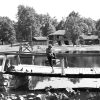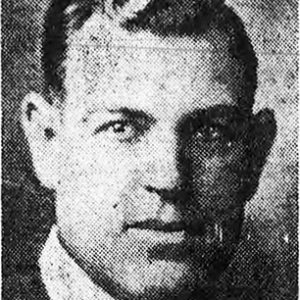calsfoundation@cals.org
Ray Winder (1885–1967)
Ray Winder was a minor league baseball executive. After learning the ins and outs of the minor league baseball business through a decade of short-term stints with teams in the Southeast, Winder joined the Little Rock Travelers (now the Arkansas Travelers) for good in 1931. By the mid-1940s, he had become one of the team’s owners and was the driving force behind the team for the next twenty years.
Ray Winder was born in Indian Springs, Indiana, on February 5, 1885. He moved to Little Rock (Pulaski County) with his family in 1905 to run a livery stable. While the stable was the last in the city to close, it was still a dying business, and Winder was forced to look elsewhere for employment. He had long loved baseball, having played (badly, by his own account) amateur baseball as a young man. He served as a ticket taker for the Little Rock Travelers in 1915, and he started his lifelong career in minor league management in 1921 in Chickasha, Oklahoma, with the Chickasha Chicks. He moved on from there to operate teams in Joplin, Missouri; Muskogee, Oklahoma; Knoxville, Tennessee; and Montgomery, Alabama, before returning to Little Rock. After an unsuccessful effort to operate a set of miniature golf courses, he was hired by the new ownership of the Travelers in 1931 as the team’s business manager. He soon became the road secretary for the team as well. In 1944, Winder became a part owner of the team, and he increased his stake two years later, becoming the second-largest shareholder. He also became general manager.
As a central figure in the Travelers organization for over three decades, Winder oversaw many of the highs and lows of Travelers’ history. During the Winder years, the team won pennants in the Southern Association in 1937, 1942, and 1951, although it was never able to secure the overall Dixie Series championship. In 1963, in the team’s first year in the Pacific Coast League, one of the best Traveler offenses of all time helped the team win the league’s Eastern Division crown.
The Travelers under Winder sent a number of players to the majors, including Hall of Fame pitchers Jim Bunning, who played for the Travelers in 1953 and 1954, and Ferguson Jenkins, who played with the club from 1963 to 1965. Meanwhile, Dick Allen—who followed up his 1963 season with the Travelers with the 1964 National League Rookie of the Year Award and later as the 1972 American League Most Valuable Player—was probably the best offensive player in the Travelers’ line-up while Winder was at the helm.
Winder’s greatest contribution to Arkansas baseball was his development and implementation of a novel ownership plan. Following the 1958 season, the team was moved to Shreveport, Louisiana. In an effort to secure a new team, as well as to ensure a team’s long-term ties to Little Rock, Winder formed the Arkansas Travelers Baseball Club, Inc., in 1960. He then led a public stock drive designed to raise the money necessary to buy—and then move—the New Orleans, Louisiana, franchise to Little Rock. At the time, each share of stock in the Travelers was worth $5. The effort was a rousing success, and with the hometown ownership fully in control, Travelers baseball returned to Little Rock for the 1960 season.
In 1960, The Sporting News named Winder the Minor League Executive of the Year, and he was added to the Arkansas Sports Hall of Fame in 1962. In 1966, Winder was named “King of Baseball” by The Sporting News, with the presentation being made by baseball great Stan Musial before a Travelers game. On August 26, 1966, Travelers Field was renamed Ray Winder Field.
Winder was best known for his work with the Travelers, but he also served as an alderman in Little Rock from 1932 to 1940, a time of major city development. Winder was also a member of the Chamber of Commerce and Rotary Club. In addition, his experience in the livery business helped him in his roles as director and president of the Junior League’s annual horse show, a fundraiser event for a school providing assistance to children with speech defects.
After a fifty-year career with the team, Winder reluctantly retired in 1965. He and his wife, Little Rock native Fora Karr Winder, remained in the city and were living there when he died on July 14, 1967. He is buried in the city’s Roselawn Memorial Park.
For additional information:
Bailey, Jim. Travelers Baseball 90 Years. Little Rock: Arkansas Travelers Baseball Club, Inc., 1997.
Nelson, Rex. “The Rich History of the Arkansas Travelers.” Talk Business and Politics, May 21, 2015. http://talkbusiness.net/2015/05/the-rich-history-of-the-arkansas-travelers/ (accessed November 18, 2015).
Traub, Todd. The Last At-Bat: The Arkansas Travelers at Ray Winder Field . Little Rock: WEHCO Publishing, 2006.
Turner, Terry. Baseball in Little Rock. Charleston, SC: Arcadia Publishing, 2004.
William H. Pruden III
Ravenscroft School
 Business, Commerce, and Industry
Business, Commerce, and Industry Early Twentieth Century, 1901 through 1940
Early Twentieth Century, 1901 through 1940 Recreation and Sports
Recreation and Sports Ray Winder
Ray Winder 




Comments
No comments on this entry yet.